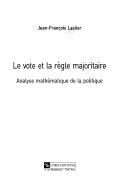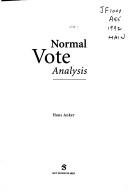| Listing 1 - 10 of 186 | << page >> |
Sort by
|
Book
ISBN: 1009356992 1009357018 100935700X 1009357034 9781009356992 9781009357012 9781009357005 9781009357036 Year: 2023 Publisher: Cambridge Cambridge University Press
Abstract | Keywords | Export | Availability | Bookmark
 Loading...
Loading...Choose an application
- Reference Manager
- EndNote
- RefWorks (Direct export to RefWorks)
This phenomenon of retrospective voting requires that individuals integrate and appraise streams of performance information over time. Yet past experimental studies short-circuit this 'integration-appraisal' process. This title develops a new framework for studying retrospective voting and present eleven experiments building on that framework.
Book
ISBN: 9780192894137 0192894137 Year: 2023 Publisher: Oxford: Oxford University Press,
Abstract | Keywords | Export | Availability | Bookmark
 Loading...
Loading...Choose an application
- Reference Manager
- EndNote
- RefWorks (Direct export to RefWorks)
In many established democracies, vote choices are growing more volatile over time. This book assesses how changes in voters' decision making process have contributed to this change. The first part of the book examines the evidence for the claim that the increase in volatility results from a shift in weight from long-term to more short-term determinants of the vote choice. This overview and the analyses that are presented highlight the limitations of existing theories of electoral change and call for novel explanations for voter volatility. The second part of the book makes the argument that group-based cross-pressures are an important source of volatility. Such cross-pressures, that results from the fact that citizens' socio-demographic characteristics and group-memberships pull them in different partisan directions, imply voters' decision making process lacks constraint, ultimately making the vote choice more volatile. The book tests this argument by means of longitudinal election survey data from eight established democracies, which allows tracing changes in the vote choice process since the 1950s. The over-time increase in levels of group-based cross-pressures provide a first indication of their importance for explaining over-time changes in voting behaviour. The empirical analyses that are presented next provide more evidence that is in line with this theoretical argument. The results show that group-based cross-pressured voters are less likely to be partisan, are less guided by short-term determinants when choosing a party, make their vote choice later and switch parties more. Analyses that make use of panel survey data confirm these key findings

ISBN: 9782271062659 2271062659 Year: 2004 Publisher: Paris: CNRS,
Abstract | Keywords | Export | Availability | Bookmark
 Loading...
Loading...Choose an application
- Reference Manager
- EndNote
- RefWorks (Direct export to RefWorks)

ISBN: 9073052378 Year: 1992 Publisher: Amsterdam : Het Spinhuis,
Abstract | Keywords | Export | Availability | Bookmark
 Loading...
Loading...Choose an application
- Reference Manager
- EndNote
- RefWorks (Direct export to RefWorks)
Book
ISBN: 9789570831368 9570831367 Year: 2007 Publisher: Taibei Shi : Lian jing chu ban shi ye gu fen you xian gong si,
Abstract | Keywords | Export | Availability | Bookmark
 Loading...
Loading...Choose an application
- Reference Manager
- EndNote
- RefWorks (Direct export to RefWorks)
Elections --- Voting research --- History.
Book
ISBN: 2200270429 Year: 2010 Publisher: Paris : Armand Colin,
Abstract | Keywords | Export | Availability | Bookmark
 Loading...
Loading...Choose an application
- Reference Manager
- EndNote
- RefWorks (Direct export to RefWorks)
De la discussion politique à la manifestation de rue, du vote à la consommation engagée, de la grève des urnes à celle de l'impôt ou à l'Internet militant, cet ouvrage porte un regard novateur sur une question centrale en démocratie : la "participation politique". Une participation foisonnante, multiforme, contournant les canaux institutionnels, débordant les frontières de l'État nation, mais toujours inégalitaire. Il présente les grands modèles explicatifs et leurs applications concrètes, les auteurs marquants, les concepts clés de la sociologie politique contemporaine, tant française qu'étrangère, ainsi que les principaux débats qui la traversent. S'appuyant sur les grandes enquêtes tant hexagonales (Cevipof) qu'internationales (ESS, Enquêtes valeurs, ISSP) depuis les années 60, l'auteur resitue le cas français dans une perspective historique, comparative et interdisciplinaire. Autant d'atouts qui font de ce livre un outil indispensable pour penser la redéfinition des frontières du politique, et la référence pour aborder la "crise" de la représentation que traversent toutes les démocraties occidentales.
Book
ISBN: 0300025572 9780300025576 0300027036 9780300027037 Year: 1981 Publisher: New Haven Yale University Press
Abstract | Keywords | Export | Availability | Bookmark
 Loading...
Loading...Choose an application
- Reference Manager
- EndNote
- RefWorks (Direct export to RefWorks)
Elections --- Voting --- Voting research
Book
ISBN: 8132117484 8132116283 9788132116288 9788132110446 8132110447 Year: 2013 Publisher: New Delhi SAGE Publications
Abstract | Keywords | Export | Availability | Bookmark
 Loading...
Loading...Choose an application
- Reference Manager
- EndNote
- RefWorks (Direct export to RefWorks)
Measuring Voting Behaviour in India captures the dynamics of multiple methodologies used for measuring voting behavior in India in the past and present. The authors elaborate on various methods that are used for measuring voters' opinions, attitudes, and perceptions. They discuss the advantages and disadvantages of each method to capture the multiplicity of the electoral experience of diverse voters across different settings in India. This they accomplish utilizing their long experience of conducting national- and state-level election surveys in India and by simultaneous studies using
Voting research --- Voting --- Elections
Book
ISBN: 9780774817837 Year: 2010 Publisher: Vancouver UBC press
Abstract | Keywords | Export | Availability | Bookmark
 Loading...
Loading...Choose an application
- Reference Manager
- EndNote
- RefWorks (Direct export to RefWorks)
Book
ISBN: 0774817852 1283335557 9786613335555 9780774817851 9781283335553 9780774859363 0774859369 9780774817837 0774817836 9780774817844 0774817844 Year: 2010 Publisher: Vancouver
Abstract | Keywords | Export | Availability | Bookmark
 Loading...
Loading...Choose an application
- Reference Manager
- EndNote
- RefWorks (Direct export to RefWorks)
The recent string of minority governments has reminded Canadians that voting behaviour has serious consequences � on the composition of government as well as on the direction of public policy. Understanding the underlying meaning of election results is a key issue for policy makers and for students and scholars of politics. But can voting behaviour be explained, given that each vote represents the influence of countless impressions, decisions, and attachments? Voting Behaviour in Canada reveals the challenges of understanding election results as leading young scholars of political behaviour piece together a comprehensive portrait of the modern Canadian voter. By systematically exploring long-standing attachments, short-term influences, and proximate factors (campaign issues and poll results), the contributors offer a multifaceted analysis of voting behaviour that incorporates the insights of theories developed to illuminate the influence of certain factors. Theoretically grounded and methodologically advanced, Voting Behaviour in Canada sheds new light on the choices we make as citizens and provides important insights into recent national developments.
| Listing 1 - 10 of 186 | << page >> |
Sort by
|

 Search
Search Feedback
Feedback About UniCat
About UniCat  Help
Help News
News